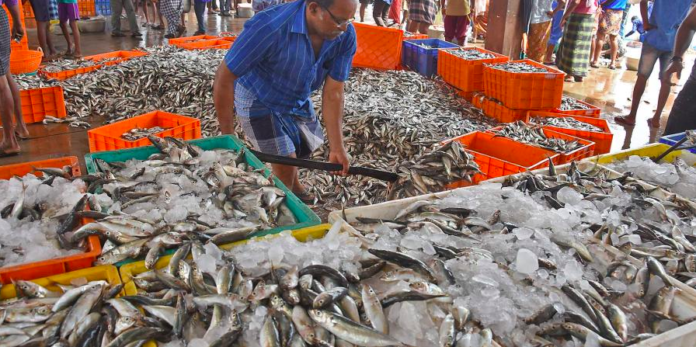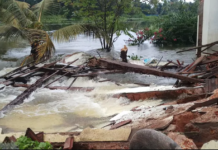Fish from Andhra, Tamil Nadu to Kerala laced with formaldehyde – a poisonous chemical normally used to preserve dead bodies in mortuaries.
Thiruvananthapuram: Fish-eating Kerala is alarmed. Nearly 30 tonnes of fish sent from Andhra Pradesh and Tamil Nadu were found to be laced with formaldehyde – a poisonous chemical normally used to preserve dead bodies in mortuaries.
As the news spread, people have stopped buying fish, sending fish prices crashing and fish merchant penniless. While the consignments from Andhra Pradesh were seized during a surprise check at a checkpost in the north, the Tamil Nadu consignments were seized from checkposts in south Kerala.
Prawns and costly fish coming mainly from farms in AP and Thoothukudi (Tuticorin) in Tamil Nadu were either preserved in concentrated Formalin or were found to be stale.
The seized consignments have been sent back to the respective states with orders that they be destroyed as Kerala does not have the space to dispose off the deadly and stale fish.
As alarm bells started ringing, health minister K K Shailaja convened an emergency meeting of officials of food safety to review the situation. She directed food safety officials to file FIRs immediately if the fish samples are found to have presence of chemicals in the preliminary test conducted using the kit developed by Central Institute of Fisheries Technology (CIFT).
Fish merchants have decided to stop buying fish from Andhra Pradesh and Tamil Nadu and depend on local catch. But that will hardly meet the demand as Kerala consumes large amount of fish.
All Kerala Fish Merchants and Commission Agents Association president K P M K Kunhi said they will “inform sellers in Andhra Pradesh that we will not buy fish from them unless we are convinced that harmful preservatives like formalin are not used. It will continue till they guarantee that the fish from their state is not chemically-contaminated.”
Deadly chemical-laced fish coming from AP and TN would have gone unnoticed but for the scientists of Kochi-headquartered Central Institute of Fisheries Technology (CIFT). They were able to develop a rapid detection kit for testing fish quality.
The rapid detection kit contains 25 testing strips, reagent solution and standard chart for colour comparison. The strip has to be rubbed on the surface of fresh fish or fish meat, and then 1-2 drops of the reagent solution can be added to get a colour change. These rapid detection kits would help the consumers for easy detection of adulterants in domestically marketed fish. It is expected that the commercialization of the technology may bring the cost below Rs 3 per test.
“It can detect the presence of ammonia, formaldehyde and sodium benzoate used in fish as preservatives. Ammonia is used to make the fish look fresh and shiny, formaldehyde increases shelf life and prevents decay while sodium benzoate reduces the microbial levels in the fish,” said Satyan Kumar Panda, principal scientist.
It is not just fish alone that is coming with poison. Fruits and poultry from Tamil Nadu have pesticides well above permissible levels. Even tender coconuts are not spared.
Adding to the woes of Keralites, batches of mineral water from various companies were found to be contaminated with human faeces.
For years, people in north Kerala have been affected due to the use of banned pesticide endosulfan for cashew crops. For over two decades, children with stunted growth and deformities have been fighting legal battles for relief.
Keralites may have to soon stop depending on neighbouring states and cultivate its own fruits, vegetables, poultry and fish. But then, the state has no space for all this and the demand far exceeds supply.





















































